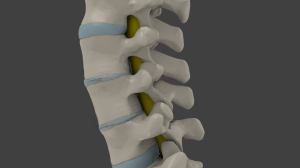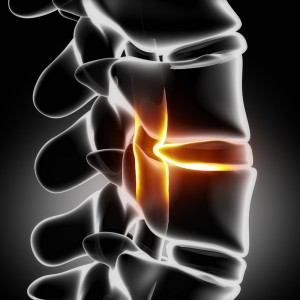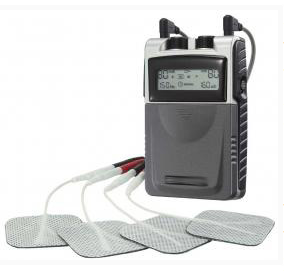Technically “degenerative disc disease” is not a disease, but rather it is a degenerative condition of the intervertebral discs of the spine (wherein the discs may suffer deterioration caused by injury or aging). The condition may consist of bulging and/or herniated discs  which in turn may impinge the nerve associated with that particular vertebra, and so cause severe, possibly debilitating pain.
which in turn may impinge the nerve associated with that particular vertebra, and so cause severe, possibly debilitating pain.
As a patient ages the intervertebral disc loses elasticity and becomes smaller and so the vertebrae come closer together and may contact or compress a nerve. Contact with nerves not only cause pain but can have a negative effect on nerve/muscle function.
Often times, degenerative disc disease exists as a non-painful condition and an injury at work or from a car accident exacerbates the condition. This may turn a non-painful situation into a very painful condition.
When this happens, treatment with a workers compensation doctor or personal injury doctor may be needed to alleviate pain.
Physical therapies
Treatment for the condition can include physical therapy, and exercise. Pain management that includes facet or intradiscal injections and/or opioid pain medications, or for more advanced conditions surgery is a last resort.
Physical therapy may consist of stretching and light exercise, to stretch and strengthen the muscles to provide better support for the spine. Therapeutic massage and ultrasound treatment may also be used in physical therapy.
Chiropractic care
Chiropractic care involves the physical manipulation of the spine in order to relieve pressure on a nerve to provide relief from pain. Some patients benefit from chiropractic care, but usually persons with more advanced levels of degeneration will not.
Electrical stimulation with a TENS unit (Transcutaneous Electrical Nerve Stimulators) is often used in chiropractic care and physical therapy. TENS units utilize electricity to interrupt and override pain signals to provide temporary relief. Again, some patients will benefit more from this treatment than others.
Facet injections
For higher levels of degeneration a patient may benefit from facet injections. Facet injections utilize a mixture of corticosteroid and numbing medications to numb the nerve to provide a more long term pain relief.
This procedure consists of the patient receiving a series of injections in the area near the degenerated disc to numb the nerve associated with that area in order to provide pain r elief. This procedure is commonly used in patients with advanced degeneration and is often used in combination with opioid pain relievers. Phoenix workers compensation pain management specialists perform these procedures.
elief. This procedure is commonly used in patients with advanced degeneration and is often used in combination with opioid pain relievers. Phoenix workers compensation pain management specialists perform these procedures.
Medication Management
The best medical treatments for DDD involve NSAIDS, Tylenol and only short term opiates when exacerbations occur.
These involve placing cortisone directly into the affected disc. While not a long term solution, the steroid injection can help for months at a time. Once the pain relief wears off, the injection may be repeated.






Leave A Comment